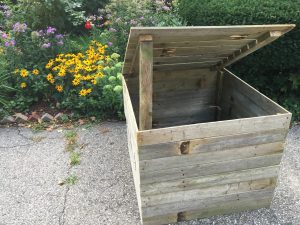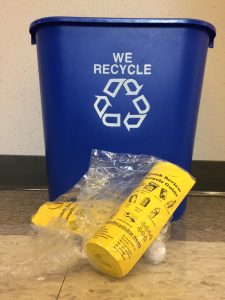By Ken Freestone, GreenMichigan.org
 Rising from its Earth Day beginnings in the early 1970s, the message of “reduce, reuse and recycle” has been taught to millions through brochures, advertisements, T-shirts and countless other ways. We have come a long way from those days, but we still have much work to do, with plenty of opportunities to improve our recycling rates.
Rising from its Earth Day beginnings in the early 1970s, the message of “reduce, reuse and recycle” has been taught to millions through brochures, advertisements, T-shirts and countless other ways. We have come a long way from those days, but we still have much work to do, with plenty of opportunities to improve our recycling rates.
There is good reason to improve those rates, too. These benefits, below, suggest that recycling is something everyone can embrace:
Recycling creates more jobs than disposal;
Recycling generates income;
Recycling uses less energy than mining, harvesting, importing and otherwise processing raw materials;
Recycling destroys less habitat; and
Recycling creates less greenhouse gas than landfilling.
 Today, Americans recycle 34 percent of the waste they create. Michigan, however, has an estimated recycling rate of just 15 percent. And, while the U.S. recycling rate has been increasing – it was a mere 6.2 percent 50 years ago – more waste is being created than ever before, too. In total, Americans
Today, Americans recycle 34 percent of the waste they create. Michigan, however, has an estimated recycling rate of just 15 percent. And, while the U.S. recycling rate has been increasing – it was a mere 6.2 percent 50 years ago – more waste is being created than ever before, too. In total, Americans
generated 254 million tons of trash in 2013 – about 4.4 pounds per person per day.
Many European countries have developed more successful recycling programs, with Austria and Germany boasting the highest recycling rates at 63 and 62 percent, respectively.
Here are some recycling numbers to know from the Michigan Department of Environmental Quality:
- $435 million: The market value of recyclable metal, glass and plastic that Michigan households send to landfills every year.
- 45: Number of stakeholders involved in forming Michigan’s recycling plan, including recyclers, grocers, bottlers, and landfill operators.
- 25: Number of Michigan’s 83 counties where residents have convenient access to recycling.
- Over 90 percent: Return rate for refundable bottles and cans in Michigan.
- 6th lowest: Michigan’s rank in recycling of the six Great Lakes states.

- Many more things can be recycled than we often realize. For example:
Goodwill takes fabrics of all kinds. Even torn and ripped clothing gets bundled and sold as scrap.
Many arts organizations can reuse giant cardboard boxes, colored paper, books, magazines, cardboard tubes, fabric, plastic jugs and bottles for art and craft projects.
Comprenew will take almost any old electric devices for recycling at a drop-off site and resale electronics store in Holland Township.
The Shipping Company in Holland will accept and reuse foam peanuts.
Backyard composting is one of the easiest ways to repurpose/recycle food and yard waste.
Ken Freestone is co-founder of GreenMichigan.org. He has worked on environmental stewardship, trails, greenways and land protection, as well as taught as a master composter, for more than 25 years.
LEARN MORE
Here are web resources to learn more about what and how to recycle:
Greenmichigan.org Comprehensive look at environmental solutions, including recycling.
miottawa.org/Health/OCHD/hh_recycle.htm Ottawa County Household Hazardous Waste program guidelines, locations, links to other information.
Michiganrecycles.org Michigan Recycling Coalition resources, including master recycler manual for individuals and business.
Earth 911.org A national database for recycling.
Terracycle.com Company focused on hard to recycle materials offers recycling bins for more than 100 categories of materials – even items like used markers and toothbrushes.
PHOTO CUTLINES –
deq rate chart.jpg . — Michigan has the goal of doubling its recycling rate, to 30 percent – still below the national average of 34 percent. Source: Michigan DEQ
Reclaimed3.jpg — This composting bin has the added benefit of being made from reclaimed wood.
Recycling containers.jpg. – Convenient containers can encourage easy recycling at home and work.
![]() This Week’s Sustainability Framework Theme:
This Week’s Sustainability Framework Theme:
Community & Neighborhood: The places we live and the individuals we interact with support the development of our personalities and perspectives on life. Encouraging vital and effective communities is essential.
 ABOUT THIS SERIES
ABOUT THIS SERIES
Living Sustainably is a collection of community voices sharing updates about local sustainability initiatives. It is presented by the Holland-Hope College Sustainability Institute, a joint project of Hope College, the City of Holland and Holland Board of Public Works. Go to www.hope.edu/sustainability-
institute for more information.

